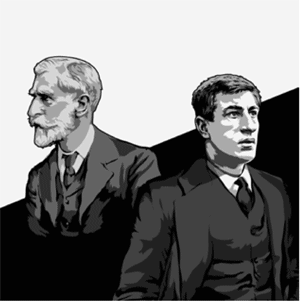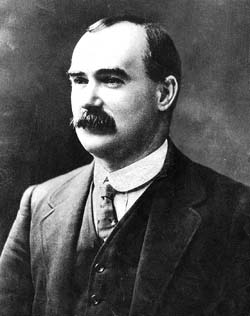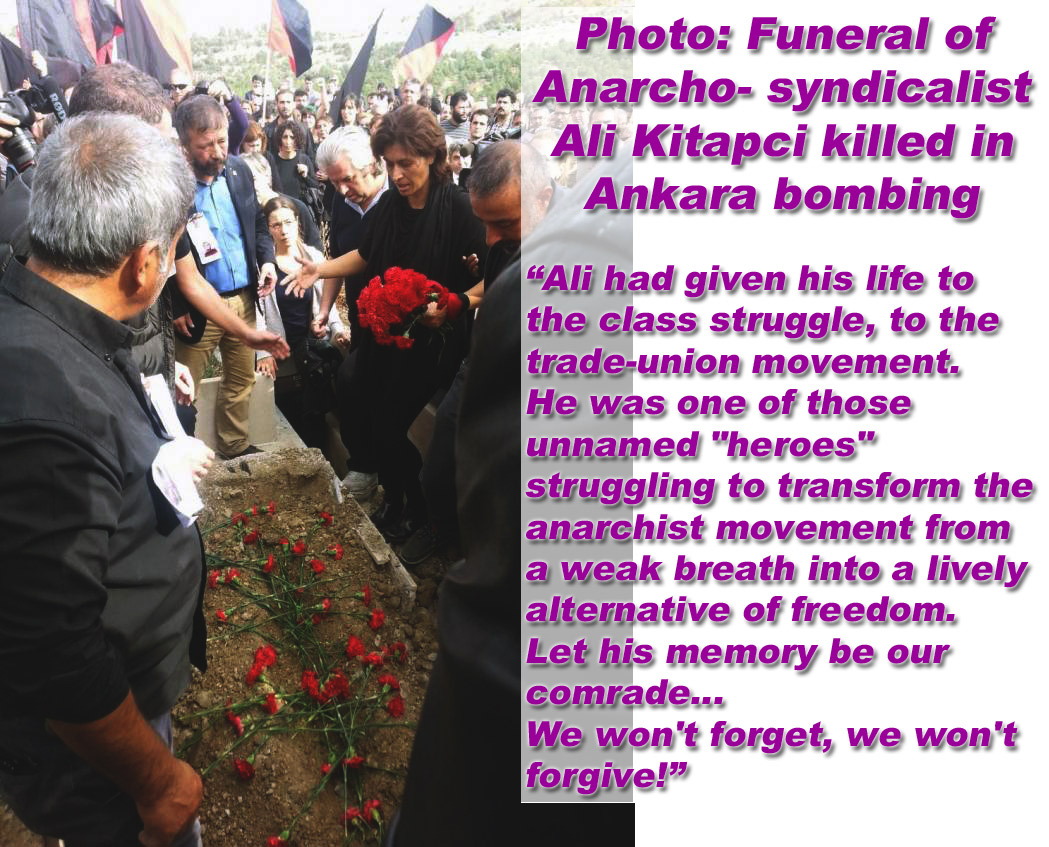Over 30 years of anarchist writing from Ireland listed under hundreds of topics
Syndicalism
WSM Points of Unity Explained: 5 - Trade Unions
'5. A major focus of our activity is our work within the economic organisations of the working class (labour organisations, trade unions, syndicates) where this is a possibility. We therefore reject views that dismiss activity in the unions because as members of the working class it is only natural that we should also be members of these mass organisations. Within them we fight for the democratic structures typical of anarcho-syndicalist unions like the 1930's CNT. However, the unions no matter how revolutionary cannot replace the need for anarchist political organisation(s).'
Throughout history the trade union movement has been a vitally important mass movement. In the face of bitter hardship and repression - even state murder - the downtrodden have banded together and demanded more, driving society forwards in the process. For instance, in Ireland we can thank the union movement for the end of child labour and for the 'weekend'. However, unions are not a relic for museums. Recent victories for better conditions and pay are a practical proof of that, not to mention participation of some fairly large unions in wider grassroots political campaigns. In spite of the relative decline of trade unions in the past neoliberal decades, their role today is still greatly important, as long as there are zero-hour contracts, wage cuts, pay freezes, lay-offs, unpaid overtime, long days, workplace bullying, and capitalism itself.
1913 Lockout in Dublin & Larkinism - beyond the myths
 In this article, Donal Ó Fallúin looks briefly at the politics, ideas and misconceptions around the Dublin Lockout of 1913, and shows that the event is much more complex than many have allowed it to be, by attempting to narrow it down to a small event within the nationalist narrative of the period.
In this article, Donal Ó Fallúin looks briefly at the politics, ideas and misconceptions around the Dublin Lockout of 1913, and shows that the event is much more complex than many have allowed it to be, by attempting to narrow it down to a small event within the nationalist narrative of the period.
The 1913 Lockout is a monumental event in the history of the Irish working class. It marks the single greatest confrontation between the forces of labour and capital in Irish history, and the six-month dispute which tore Dublin apart saw a new, militant spirit of trade unionism collide with the force of native capitalism in an unprecedented manner.
An anarchist look at the ideas of James Connolly - the single most important figure in the history of the Irish left
 James Connolly is probably the single most important figure in the history of the Irish left. He was an organiser in the IWW in the USA but in Ireland is best known for his role in building the syndicalist phase of Irish union movement and for involving the armed defence body of that union, the Irish Citizens' Army in the 1916 nationalist insurrection. This left a legacy claimed at one time or another not only by all the Irish left parties but also by the nationalists of Fianna Fail and Sinn Fein. In this article I will attempt to look at the long neglected anarchistic aspects of Connolly's thought and ask the question was Connolly a libertarian?
James Connolly is probably the single most important figure in the history of the Irish left. He was an organiser in the IWW in the USA but in Ireland is best known for his role in building the syndicalist phase of Irish union movement and for involving the armed defence body of that union, the Irish Citizens' Army in the 1916 nationalist insurrection. This left a legacy claimed at one time or another not only by all the Irish left parties but also by the nationalists of Fianna Fail and Sinn Fein. In this article I will attempt to look at the long neglected anarchistic aspects of Connolly's thought and ask the question was Connolly a libertarian?
Anarchists and the trade unions - Be active - be involved
Trade Unions are important organs of the working-class. Gregor Kerr - a member of the Irish National Teachers Organisation who has been involved in campaigns against "social partnership" and in many strike support groups - argues that trade union involvement should form a central part of the political activity of all anarchists.
Syndicalism : Its strengths & weaknesses
The main organisational form in libertarian politics in 1994 was syndicalism. Alan MacSimon, a delegate to Dublin Council of Trade Unions who has also attended a European gathering of revolutionary unions looked at the potential, and limits, of syndicalism.
Turkey, Ankara: Report of Funeral of Anarcho-syndicalist Ali Kitapci

We remember Ali Kitapci, the first person to organise for the anarcho-syndicalist cause in modern Turkey. He was one of the 14 members of Independent Transportation Union killed in the Ankara bombing on Saturday. He first get involved with the anarchist movement in England and continued to be active for the last 30 years. Apart from his fight for syndicalism, he was an active member of many anarchist organisations in Ankara from the second half of 1980s.
There will be a protest at the Turkish embassy in Dublin this Thursday at 18.30. The embassy is on Raglan Road. FB Event
About the International Workers' Association (IWA)
Anarcho-syndicalism has been and continues to be the most influential current within anarchism. Anarcho-syndicalists seek to build revolutionary unions, that organise all workers in a democratic union with a minimum number of full time 'officials' who will be on the average wage of those they represent and completely answerable to the rest of the membership.
This is Not SIPTU - Syndicalist Swedish SAC
CHRISTMAS saw many emigrants return for the holidays. One was Ciaran Casey who went to Sweden twenty years ago and is currently International Secretary of his union, the Central Organisation of Swedish Workers (SAC). This union describes itself as syndicalist and libertarian socialist. Workers Solidarity spoke to Ciaran and learnt
Direct Action Movement becomes Solidarity Federation
THE BRITISH section of the International Workers Association, the Direct Action Movement, is no more. In its place stands the Solidarity Federation. This is far more than just a change of name, they see it as the second step on the road to becoming a revolutionary union.
Syndicalism and Anarchism
In the 1860s the modern socialist movement was beginning to take shape. The International Working Mens' Association or First International was becoming a pole of attraction for militant workers. As the movement grew points of agreement and of disagreement between the Marxists and the Anarchists about what socialism meant and how to achieve it were becoming clear. This led to the Marxists using less than democratic means to expel the anarchists.

